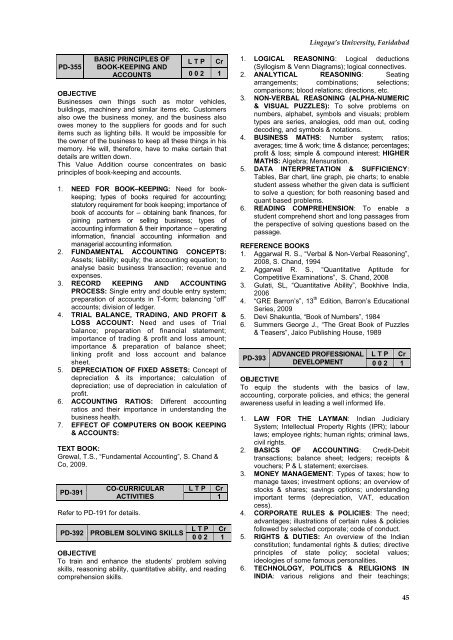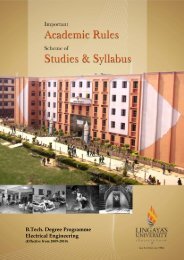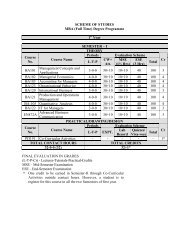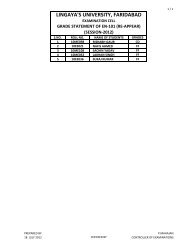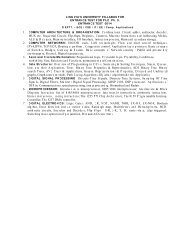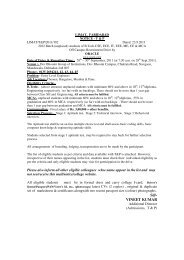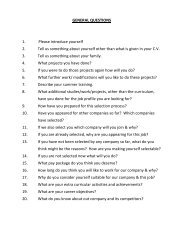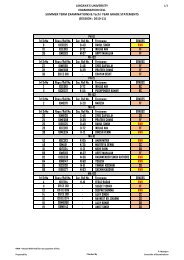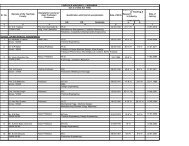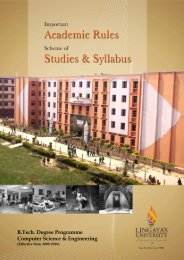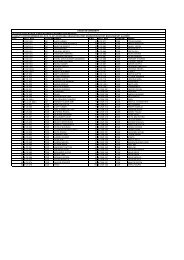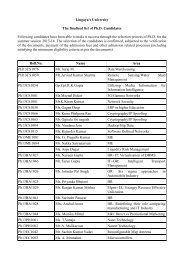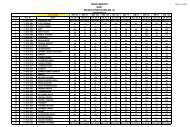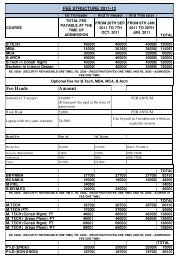Electrical and Electronics - Lingaya's University
Electrical and Electronics - Lingaya's University
Electrical and Electronics - Lingaya's University
You also want an ePaper? Increase the reach of your titles
YUMPU automatically turns print PDFs into web optimized ePapers that Google loves.
Lingaya’s <strong>University</strong>, FaridabadPD-355BASIC PRINCIPLES OFBOOK-KEEPING ANDACCOUNTSL T PCr0 0 2 1OBJECTIVEBusinesses own things such as motor vehicles,buildings, machinery <strong>and</strong> similar items etc. Customersalso owe the business money, <strong>and</strong> the business alsoowes money to the suppliers for goods <strong>and</strong> for suchitems such as lighting bills. It would be impossible forthe owner of the business to keep all these things in hismemory. He will, therefore, have to make certain thatdetails are written down.This Value Addition course concentrates on basicprinciples of book-keeping <strong>and</strong> accounts.1. NEED FOR BOOK–KEEPING: Need for bookkeeping;types of books required for accounting;statutory requirement for book keeping; importance ofbook of accounts for – obtaining bank finances, forjoining partners or selling business; types ofaccounting information & their importance – operatinginformation, financial accounting information <strong>and</strong>managerial accounting information.2. FUNDAMENTAL ACCOUNTING CONCEPTS:Assets; liability; equity; the accounting equation; toanalyse basic business transaction; revenue <strong>and</strong>expenses.3. RECORD KEEPING AND ACCOUNTINGPROCESS: Single entry <strong>and</strong> double entry system;preparation of accounts in T-form; balancing ―off‖accounts; division of ledger.4. TRIAL BALANCE, TRADING, AND PROFIT &LOSS ACCOUNT: Need <strong>and</strong> uses of Trialbalance; preparation of financial statement;importance of trading & profit <strong>and</strong> loss amount;importance & preparation of balance sheet;linking profit <strong>and</strong> loss account <strong>and</strong> balancesheet.5. DEPRECIATION OF FIXED ASSETS: Concept ofdepreciation & its importance; calculation ofdepreciation; use of depreciation in calculation ofprofit.6. ACCOUNTING RATIOS: Different accountingratios <strong>and</strong> their importance in underst<strong>and</strong>ing thebusiness health.7. EFFECT OF COMPUTERS ON BOOK KEEPING& ACCOUNTS:TEXT BOOK:Grewal, T.S., ―Fundamental Accounting‖, S. Ch<strong>and</strong> &Co, 2009.PD-391CO-CURRICULARACTIVITIESRefer to PD-191 for details.PD-392 PROBLEM SOLVING SKILLSL T PCr1L T P Cr0 0 2 1OBJECTIVETo train <strong>and</strong> enhance the students‘ problem solvingskills, reasoning ability, quantitative ability, <strong>and</strong> readingcomprehension skills.1. LOGICAL REASONING: Logical deductions(Syllogism & Venn Diagrams); logical connectives.2. ANALYTICAL REASONING: Seatingarrangements; combinations; selections;comparisons; blood relations; directions, etc.3. NON-VERBAL REASONING (ALPHA-NUMERIC& VISUAL PUZZLES): To solve problems onnumbers, alphabet, symbols <strong>and</strong> visuals; problemtypes are series, analogies, odd man out, codingdecoding, <strong>and</strong> symbols & notations.4. BUSINESS MATHS: Number system; ratios;averages; time & work; time & distance; percentages;profit & loss; simple & compound interest; HIGHERMATHS: Algebra; Mensuration.5. DATA INTERPRETATION & SUFFICIENCY:Tables, Bar chart, line graph, pie charts; to enablestudent assess whether the given data is sufficientto solve a question; for both reasoning based <strong>and</strong>quant based problems.6. READING COMPREHENSION: To enable astudent comprehend short <strong>and</strong> long passages fromthe perspective of solving questions based on thepassage.REFERENCE BOOKS1. Aggarwal R. S., ―Verbal & Non-Verbal Reasoning‖,2008, S. Ch<strong>and</strong>, 19942. Aggarwal R. S., ―Quantitative Aptitude forCompetitive Examinations‖, S. Ch<strong>and</strong>, 20083. Gulati, SL, ―Quantitative Ability‖, Bookhive India,20064. ―GRE Barron‘s‖, 13 th Edition, Barron‘s EducationalSeries, 20095. Devi Shakuntla, ―Book of Numbers‖, 19846. Summers George J., ―The Great Book of Puzzles& Teasers‖, Jaico Publishing House, 1989PD-393ADVANCED PROFESSIONALDEVELOPMENTL T P Cr0 0 2 1OBJECTIVETo equip the students with the basics of law,accounting, corporate policies, <strong>and</strong> ethics; the generalawareness useful in leading a well informed life.1. LAW FOR THE LAYMAN: Indian JudiciarySystem; Intellectual Property Rights (IPR); labourlaws; employee rights; human rights; criminal laws,civil rights.2. BASICS OF ACCOUNTING: Credit-Debittransactions; balance sheet; ledgers; receipts &vouchers; P & L statement; exercises.3. MONEY MANAGEMENT: Types of taxes; how tomanage taxes; investment options; an overview ofstocks & shares; savings options; underst<strong>and</strong>ingimportant terms (depreciation, VAT, educationcess).4. CORPORATE RULES & POLICIES: The need;advantages; illustrations of certain rules & policiesfollowed by selected corporate; code of conduct.5. RIGHTS & DUTIES: An overview of the Indianconstitution; fundamental rights & duties; directiveprinciples of state policy; societal values;ideologies of some famous personalities.6. TECHNOLOGY, POLITICS & RELIGIONS ININDIA: various religions <strong>and</strong> their teachings;45


